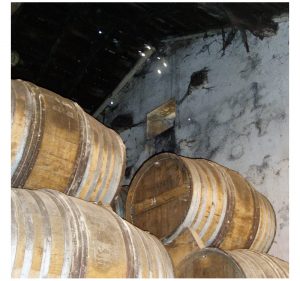The Importance of the Cognac Cellars
 The concept of barrel ageing is said to have been conceived by wine merchants when shipping their wines from the harbour at La Rochelle. The weak and commonly sweet wines that were shipped along the Charente from Cognac often became rancid. The wine merchants therefore reduced their volume by distillation, before shipping abroad in oak barrels. After their arrival in foreign ports it was noticed that the clear distillates within had coloured and gained in flavour.
The concept of barrel ageing is said to have been conceived by wine merchants when shipping their wines from the harbour at La Rochelle. The weak and commonly sweet wines that were shipped along the Charente from Cognac often became rancid. The wine merchants therefore reduced their volume by distillation, before shipping abroad in oak barrels. After their arrival in foreign ports it was noticed that the clear distillates within had coloured and gained in flavour.
Many centuries later we have learnt much about ageing our cognacs. The considerations of barrel age, size and wood are regarded by many as secondary to the dampness and location of the cellar. Dampness in the cellar helps the cognac to mature in the barrel for longer as it reduces evaporation of the spirit through the wood. There are thousands of cellars in the Cognac region which also hosts two major rivers. The Charente passes through the middle and the Ne passes round the southern half of the top cru Grande Champagne. It is therefore reasonable to believe that many of the finest cognac cellars are situated close to these rivers, taking advantage of the increased humidity.
However, ideal damp conditions can be created in other ways. Many old stone-built stores were converted outhouses which had had their floors ripped out, thereby removing any damp course between the building and the earth. New custom-built stores, mainly owned by the big houses, are complete with humidifiers which regulate the atmosphere. A more questionable method of creating damp barrels is to spray them with water but this is usually only employed during very hot conditions.
Of course, wherever they are kept, the atmosphere inside a sealed barrel is unlikely to change. The temperature may alter slightly, and the amount lost to evaporation (known as the Angel’s Share) may differ but otherwise the quality of the cognac should remain the same.
